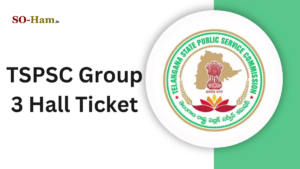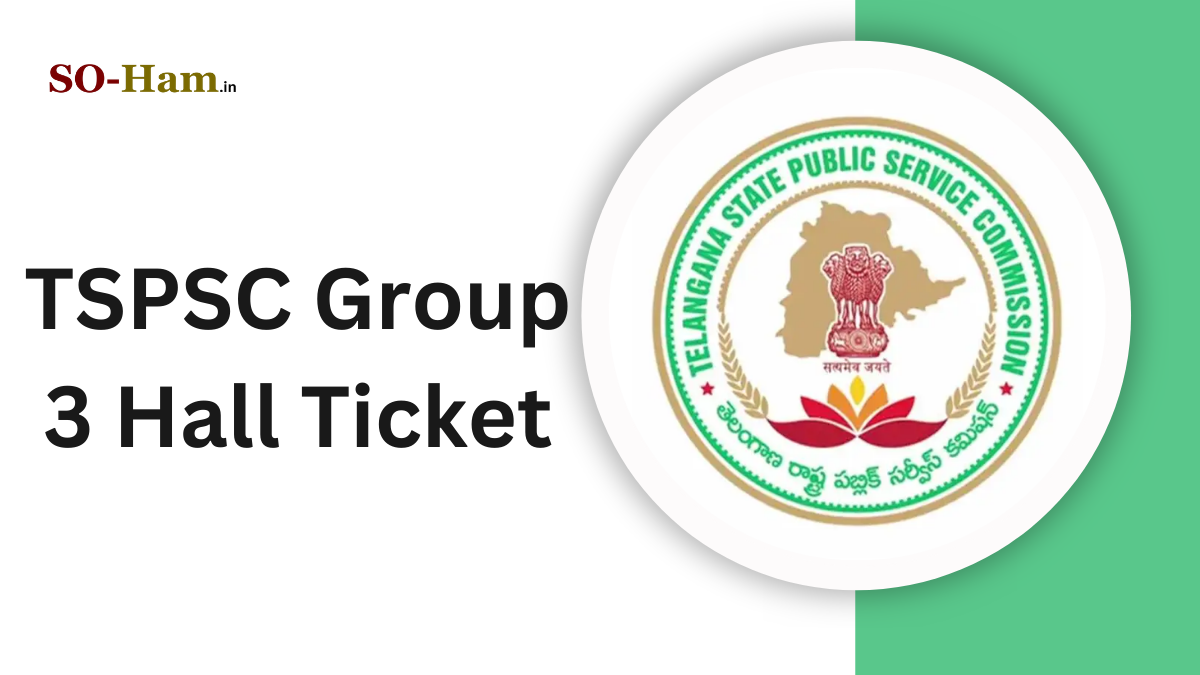The Telangana State Public Service Commission (TSPSC) is set to conduct the Group 3 recruitment examination for various posts in the state. After the completion of the application process, the next crucial step is the release of the TSPSC Group 3 Hall Ticket, which will be available on the official website.
Candidates who have applied for the exam eagerly await this document, which is essential for entering the examination hall.
The TSPSC Group 3 exam is scheduled to take place on November 17th and 18th, 2024, and the hall ticket will be made available around November 10th, 2024.
This article provides a detailed breakdown of the exam date, hall ticket download process, and other key details that candidates should be aware of.

Overview of TSPSC Group 3 Hall Ticket 2024
The TSPSC Group 3 exam is a significant recruitment drive aimed at filling various posts within the Telangana state government.
The written examination will be conducted for a total of 1363 vacancies. Candidates who successfully applied for the Group 3 posts will need to download their hall tickets from the official TSPSC website before the examination date.
The hall ticket contains vital information about the exam, including the venue, time, and candidate details.
- Recruitment Body: Telangana State Public Service Commission (TSPSC)
- Exam Date: November 17th and 18th, 2024
- Hall Ticket Release Date: November 10th, 2024
- Post Name: Various Group III Posts
- Total Vacancies: 1363
- Official Website: TSPSC Official Website
TSPSC Group 3 Exam Pattern and Structure
The TSPSC Group 3 examination consists of three papers, each designed to test candidates’ knowledge in various subjects. The exam will feature multiple-choice questions (MCQs) and will be conducted in a computer-based or OMR-based format.
Detailed Paper Structure:
- Paper I: General Studies and General Abilities – 150 marks
- Paper II: History, Polity, and Society – 150 marks
- Paper III: Economy and Development – 150 marks
Each paper is 2 hours and 30 minutes long, and the total marks for the written exam will be 450. Candidates will have the option to choose the language of the question paper, with options including English, Telugu, and Urdu.
Selection Process for TSPSC Group 3
The selection process for the TSPSC Group 3 posts is divided into multiple stages, each designed to assess the candidates’ abilities in different areas.
- Written Examination: The first stage of the recruitment process involves the written exam, which consists of three papers, each focusing on distinct subjects.
- Interview: Candidates who qualify the written exam will be called for an interview, where their personality and communication skills will be evaluated.
- Document Verification: After the interview, candidates will need to undergo a verification process to confirm their eligibility and documents.
- Final Merit List: A final merit list will be prepared based on the overall performance in the written exam and interview.
Candidates must ensure they meet the eligibility criteria and perform well at each stage to secure their place in the final list.
How to Download TSPSC Group 3 Hall Ticket?
Downloading your TSPSC Group 3 Hall Ticket is a simple process. Follow these steps to access and download the document:
- Visit the official TSPSC website: tspsc.gov.in.
- On the homepage, click the link that says “Know Your Hall Ticket Number”.
- Enter the required information, including your TSPSC ID and Date of Birth.
- After submitting the details, your hall ticket will appear on the screen.
- Download the hall ticket and take a printout for future reference.
Make sure to keep a hard copy of your hall ticket, as you will need to carry it with you on the day of the exam. Also, verify all the details mentioned on the hall ticket to avoid any confusion on exam day.
Key Details on the TSPSC Group 3 Hall Ticket
The hall ticket contains several important details that candidates need to check before the exam. These include:
- Candidate’s Name: Ensure your name is correctly mentioned.
- Roll Number: This is unique to each candidate and essential for identification.
- Date of Birth: Make sure this is accurate.
- Gender: Confirm the gender mentioned is correct.
- Exam Date and Time: The date and time of your specific examination session.
- Venue Details: The address of the examination center.
- Reporting Time: Arrive at the exam center well before the reporting time mentioned on your hall ticket.
- Photograph and Signature: These should match your identity proof.
If there are any discrepancies in the hall ticket, immediately contact TSPSC authorities for rectification.
Conclusion
The TSPSC Group 3 Hall Ticket is a crucial document that every candidate must download to participate in the exam. By following the download process carefully and verifying the details on the hall ticket, candidates can ensure they are fully prepared for the exam.
The exam will test candidates on a range of topics, so it is essential to study thoroughly and stay updated with any announcements from TSPSC.
Wishing all candidates the best of luck as they prepare for the TSPSC Group 3 Examination 2024.
People May Ask
1. When will the TSPSC Group 3 Hall Ticket be available?
The TSPSC Group 3 Hall Ticket will be available for download from November 10th, 2024.
2. How can I download my TSPSC Group 3 Hall Ticket?
To download the hall ticket, visit the official TSPSC website, click on “Know Your Hall Ticket Number”, and enter your TSPSC ID and Date of Birth.
3. What is the exam date for the TSPSC Group 3 examination?
The written exam for TSPSC Group 3 will be held on November 17th and 18th, 2024.
4. What should I carry along with my hall ticket?
Along with the hall ticket, candidates must carry a valid photo ID such as an Aadhar card, Voter ID, or Passport.
5. What is the format of the TSPSC Group 3 exam?
The exam consists of three papers, each containing 150 multiple-choice questions. The total exam duration is 2 hours and 30 minutes for each paper.
6. In which languages will the TSPSC Group 3 exam be conducted?
The exam will be available in three languages: English, Telugu, and Urdu.
Click here to learn more.

